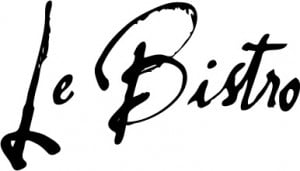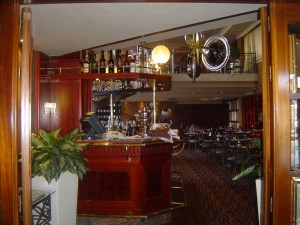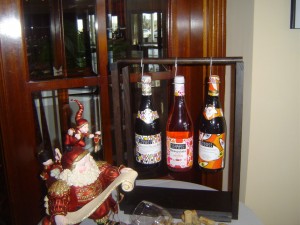
Dione Borg at Le Bistro, Radisson Blu Resort, St Julian’s
In 2001, a journalist by the name of Dione Borg published a book called Liberta’ Mhedda, which recounted the period of political violence in the late 1980s when Malta was brought to the brink with the murder of Raymond Caruana. Over the last few weeks, this period has been recalled time and again as the 25th anniversary of a culmination of the dark events is being commemorated by the Nationalist party. Recently, Dione’s TV programme Evidenza, about unsolved murder cases, has also focused on Caruana’s death.
Today, Dione Borg is seated in front of me at Le Bistro, at the Radisson Blu; we are here not only to talk about the past and the present, but more crucially about the political future of this often volatile nation of ours.
Malta’s most popular 24 hour bistro is the ideal place for a quiet lunch on this cold December afternoon. Perhaps significantly, given the subject at hand, we both decide to go for something ‘typically Maltese’ and we order the rabbit stew.
If I had to find one word to describe, Dione I would say that he is a newshound…a newspaper man through and through. Over the last 20 years, however, as employees of Medialink, the media house owned by the Nationalist party, print journalists have also had to make the adjustment to radio and television.
“It did not make sense to have two different journalists going to the same coverage, one to cover it for the paper and one for Radio 101, so I understood that decision”, he tells me. “Personally, I’m not really that comfortable in front of the camera, although I do enjoy producing, and have produced several documentaries such as Storja ta’ Poplu and Skoperti. With Evidenza I felt I needed to be the one presenting it because I was the one who had carried out the research and knew what questions to ask.”
It is clear that he was profoundly affected by the events of the 1980s.
“I’m 46, so the ‘80s for me were the days of my youth. In ’81 I was 17, and I just missed out on having the right to vote. Then in ’86/’87 I was in my early 20s, which is when you start forming your opinions and your political beliefs.”
Surprisingly enough, his family was not involved in politics at all.
“Xejn, (nothing),” he stresses. “In fact when I used to take part in political activities at the time, like all young people in the 80s used to do, my family was very worried. Journalism for me was the next logical step within the circumstances I was living in. I was always good at writing, so the 80s for me presented a challenge, and planted in me this sense of duty, which in turn led me to becoming a journalist. After all, what you write remains there forever.”
Despite his long years of experience within the newsroom, Dione has always remained in his words, “just another journalist”, working shifts like everyone else. The idea of being an editor never really appealed to him, and he is rather proud of being “on the front line”, going to coverages, and being assigned to cover every single Labour mass meeting.
Over the years, he has made quite a few friends from “the opposite camp” building a camaraderie with them which is characterized by a mutual respect.
“As a journalist who is there on the ground you have a certain responsibility to report accurately, to ask the right questions and more importantly, to give the story a certain context of background and history.”
I ask Dione the questions I have been wanting to ask him for a long time: does he think that continuously reminding people of what happened in the 1980s is doing more harm or good for the nation as a whole? Is Malta ready to remember what happened without both sides becoming overly sensitive, and without creating further political division?
“Actually, I feel the important events of the 70s and 80s have not been remembered enough. What exactly has the PN commemorated before now? There were incidents in the 70s which were, in my opinion, just as bad as those of the 80s. We are always harping on Zejtun, but there were the Independence Day demonstrations in Valletta in the 70s when there was violence on the same scale. Instead of tear gas, they used to throw manhole covers, and other objects at the protesters, and it is lucky no one got killed. They even had mucky water thrown at them. That was also the first time that the police were in league with political thugs – there are photos of this as evidence. And yet the Nationalist party does not commemorate this. After 1987, each year all the PN has done is remember Raymond Caruana with a Mass and flowers on his grave. The party doesn’t even commemorate what happened in Rabat! Rabat; where really serious incidents took place; where Maltese policemen for the first time in history shot at fellow Maltese civilians!”
When I ask him why, he shakes his head in bafflement, and almost struggles to explain it, “I think the party doesn’t want to keep these events at the top of its political agenda because there has been such a radical change in society. It doesn’t feel the need to keep mentioning them and to rekindle the atmosphere of those years. On the other hand, the Labour party commemorates the violence of 1958 every year. Personally, I feel that Rabat is just as important as Raymond Caruana.”
In a recent interview which Dione gave to Malta Today, he said he wishes that one day, both sides could speak about the 80s in an objective, dispassionate and yet truthful way. Unfortunately, he thinks that day is still a long way off.
“Look at Sette Giugno, when British soldiers shot at the Maltese crowd and killed four men. A lot of time has passed and relations between the Maltese government and the British government today are excellent – so despite this tragic event, we have recognized what happened, the facts are established and no one disputes them. We do not argue about it. But that is the difference; the 80s are still too fresh, too recent. I think after 1987 the two political parties should have moved closer to one another in a more structured way – in other countries where there was a national divide, governments made sure to encourage reconciliation in a formal way. In Malta, we tried to reconcile but they were only personal initiatives. Here we still cannot even agree on what really happened! It is a huge problem. As a society and a political class we have two versions of everything.”
But there is only one truth, I tell him.
“I think after 1987 the two political parties should have moved closer to one another in a more structured way – in other countries where there was a national divide, governments made sure to encourage reconciliation in a formal way…At Raymond Caruana’s Mass, for example, both political leaders should attend.”
“Yes, but not everyone wants to accept it. Personally, I think there should have been a greater effort made to establish the facts. For example, in Zebbug where the balustrades where thrown from the roofs by Nationalist supporters, the court established that it was a legitimate defense because they were being attacked. But then I still hear people say that it’s not true that in Rabat, the police fired shots. Come on! Or they say that Nationalist supporters demonstrated at Tal-Barrani, Zejtun in order to provoke Labour supporters.”
Not for the first time during this interview Dione and I find ourselves in complete agreement.
He is right that there is a lot of denial among some Labour supporters, which I put down to a great reluctance to admit that the party they believed in so blindly could hold within its ranks, the type of supporters who could carry out such acts. That is the problem with fanaticism of any kind, in my view, because it prevents you from thinking rationally.
“I think every category of society has to take responsibility for this issue – not just politicians, but journalists and historians as well. Where are the historians and scholars? A lot of people associate me with the 80s because of Liberta’ Mhedda precisely since it’s the only document, with all due respect, which chronicles what happened. I didn’t write it to blacken the name of one party over another. The book has the complete court proceedings of the Rabat and Tal-Barrani incidents and the Raymond Caruana murder, along with interviews with Eddie Fenech Adami, Guido deMarco and Louis Galea, Karmenu Mifsud Bonnici and Joe Grima. I also interviewed Alfred L-Indjan Desira, a notorious Labour supporter whom I convinced to talk to me. I researched what happened and presented my research. That is how we have to look at our recent political history – through facts.”
Dione once again mentions the huge changes which have taken place in Malta since the 80s. By way of example he points to the fact that the SMU police officer who allegedly shot at the Rabat crowd (who was eventually cleared of all charges) is today someone with whom he is on speaking terms.
“You have to move on,” he insists.
But, I tell him, that is precisely why Labour supporters feel that there is an ulterior motive behind the commemorations which have taken place – are they serving their purpose of paying (justified) tribute to those who suffered, or are they simply stoking the fires of division and political hatred, thus preventing Malta from moving on? Where do the tributes stop and the political propaganda begin?
“I agree with you there”, he says. “I feel that the fundamental point is how the commemorations take place. If you do it in a partisan way, then you are not doing the nation any good. What hurts me is when people say that I do these programmes because the elections are around the corner. Believe me when I say that the PN never gets involved in any of my documentaries or interferes in any way. I also feel that if the PN have to win the election, they’re not going to win it because of what happened 25 years ago. It would be a great mistake to think they can win it that way. However, we also have to understand that politicians who were there 25 years ago cannot now remove one mask and put on another one and act as if nothing had happened. That hurts people too much. There’s another thing…in my opinion the Labour party has not yet made an adequate apology for the 80s.”
“…if the PN have to win the election, they’re not going to win it because of what happened 25 years ago. It would be a great mistake to think they can win it that way…Those who argue that if Labour is elected we will return to that kind of organized political violence doesn’t know what he is talking about.”
Dione has anticipated my next question: if he were the Labour party leader what kind of apology would he make which would be satisfactory for PN supporters? What words would he choose which would suffice?
“Maybe rather than what you say, the apology would be in the way you act,” he says slowly. “At Raymond Caruana’s Mass, for example, both political leaders should attend.”
My only apprehension about this, I tell him, is that no matter what the Labour leader does or says, nothing will ever be enough for those who do not wish to close that chapter. Whatever Joseph Muscat says will always be interpreted as being false or forced.
“Yes,” he admits, “you will always have those pockets in society who will never accept it. But what can one do? Another thing which has prevented reconciliation is that up to the time of Alfred Sant, we kept hearing the argument that the political violence was due to double agents.”
Those who support this argument also point to the fact that the violence and the bombs stopped after 1987, but Dione is quick to retort:
“Well they are not correct because in 1989 there was that famous wedding in Zejtun when Eddie Fenech Adami and Guido de Marco were witnesses, and thugs attacked them. No one can deny this happened because I interviewed the people myself.”
We talk about another point of contention: the violent policemen who were not only retained in the force but were given promotions.
“Specific policemen could not be accused of firing shots in Rabat, because their faces were covered. Meanwhile the guns and bullets which could have been used as evidence were destroyed. However, about the promotions I agree, that is unacceptable. After 1987, people were expecting the PN government to make a complete sweep of the police force, but it could not do it without proof. It is not right that certain policemen who were mentioned are still there, but they simply could not remove them from the force just like that. That upsets a lot of people who were expecting justice and retribution.”
“After 1987, people were expecting the PN government to make a complete sweep of the police force, but it could not do it without proof. It is not right that certain policemen who were mentioned are still there, but they simply could not remove them from the force just like that. That upsets a lot of people who were expecting justice and retribution.”
There is another aspect to all this about which we agree: Most young people today don’t care about what happened in the 80s. His own children, a son aged 17 and a daughter aged 13, are typical examples.
“My son, who is at MCAST studying engineering, does not care at all about politics, and sometimes I find his complete disinterest a bit hard to swallow. Society has simply changed too much. In my day you could not help but be politically active when you saw those things happening around you! Today, you don’t have to worry about these things – you take everything for granted. Education is guaranteed; in my day it wasn’t. Young people are living in a normal society, we didn’t. Sometimes it hurts to see such complacency, and I would like to see young people show a bit more appreciation towards those who suffered injustice in the past. But in a way, that is what we worked for isn’t it? So that today they can live normally.”
“Sometimes it hurts to see such complacency, and I would like to see young people show a bit more appreciation towards those who suffered injustice in the past. But in a way, that is what we worked for isn’t it? So that today they can live normally.”
Dione is sure of one thing: that it’s impossible for the violence of the1980s to ever return because that fanatic, blind passion for one’s political party has disappeared.
“However, if there ever had to be a government which brought Malta to the brink like that again, society would rebel as it did back then. Those who argue that if Labour is elected we will return to that kind of organized political violence doesn’t know what he is talking about. You know why? Because for that kind of thing to develop you need a certain length of time and today’s society won’t allow it.”
As long as a party has been democratically elected, Dione sees nothing wrong with it being in government for a long time.
“However, when this happens it means that the Opposition has failed big time and has not presented a good enough manifesto to persuade people to vote for it. Frankly I think the Labour party has had to completely backtrack on many issues on which it had previously carried out a crusade whereas the PN has remained consistent.”
I point out that the PN has had to back down too: its considerable crusade against divorce was contradicted recently by an enormous U-turn when it declared that it would now accept it.
“But the PN at least took a position, even though it was a huge risk…whereas Labour did not even have the courage to take a stand. It simply sat on the fence to see which way the wind was blowing.”
After 22 years in government, the Nationalist party is currently facing an electorate which seems to have grown weary of it and complains at every turn. Dione feels that some of the criticism is justified because the hype of certain reforms (such as Arriva) did not match reality.
“However, I think the public is often too quick to criticize these days, because we seem to have had battles over everything. Privatization, reforms, removal of subsidies – I think this is where the unions and the PL should be a bit more responsible and understanding so that everything doesn’t have to end up in a political battle.”
Despite what seems like a restless mood within the country with many calling for change, Dione is cautiously optimistic that the PN can win the next election. “If the economy remains relatively stable despite the Euro crisis, if investment in the country continues, and if the PL does not offer a concrete alternative in plenty of time to explain it to the electorate, then yes, the Nationalist Party will win again.”
WHAT WE HAD FOR LUNCH
Freshly baked bread with olive oil and butter
Rabbit served with a choice of roast potatoes or chips
Steamed vegetables or salad
Dione’s dessert: Banoffee pie
- December 20, 2011 3 Comments Posted in: Let's do Lunch








